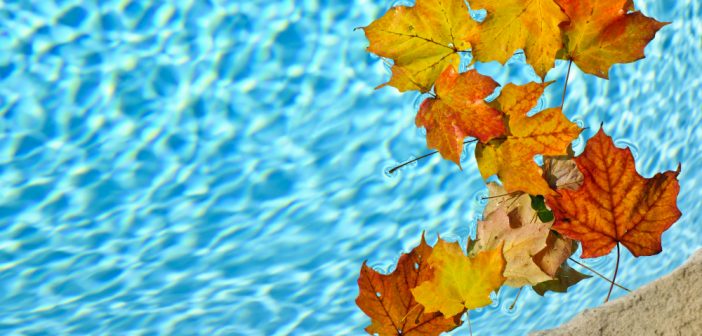Every year, the time comes when summer is officially over and so is swimming season. The temperatures are turning cooler and the swimsuits and goggles have been packed away. It’s time to start thinking about closing your pool for the fall and winter. If you’re going through this process for the very first time, rest assured it isn’t complicated. Follow these steps to successfully close your pool before the winter season.
Time your closing well
If you close your pool too early, you risk an algae and mold problem that you will have to deal with in the spring. You want the closing to coincide with cool weather. Your goal is to close your pool when the daily water temperature readings indicate the pool water temperature is at or below 65 degrees Fahrenheit (18.33 degrees Celsius) on a consistent basis.
Consult your pool manufacturer’s manual
Your pool manual includes pool closing steps that will keep the warranty valid and prolong the life of your pool. Consult these directions before closing your pool.
Chemically balance your pool water
Chemicals come with winterizing instructions. Consult the manufacturer’s instructions for the exact amount of chemical drops to add in order to achieve the optimal chemical balance for the pool water.
Unless your manual indicates otherwise, test and adjust in this order:
• pH
• Water hardness/calcium
• Alkalinity
• Chlorine
Clean your pool, accessories & supplies
Remove, clean and store all accessories, including diving boards, slides, ladders and pool furniture. Run your pool robo-cleaner (if you have one) and use a pool skimmer to net out leaves and debris. Clean out the skimmer baskets and store the lids somewhere safe. Use a cleaning brush to scrub the pool walls and floor. Run your filter for a full cycle, then clean and store your filter according to the instructions in the manual.
Shock your pool water
Add a chlorine shock to deter algae, bacteria and other fungi from growing when your pool is not in use. This sanitizes your pool thoroughly, even in small areas you might have missed during your manual cleaning.
Add algaecide
The cold season does not always deliver cold temperatures, especially if you live in a more temperate climate. Be prepared to fight off algae growth if the winter season produces warmer or wetter weather that is not typical for your area. Add algaecide, but not on same day you add the pool shock chemicals. Shock your pool a few days prior to adding the algaecide so the chlorine won’t negate the effects of the algaecide.
Lower the pool’s water level
The pool manual indicates the type of pool cover that you should use. The climate dictates how much water to let out of your pool during the cold season. It’s important to main the proper amount of water because it will affect the chemical balance in the pool. The amount of water that needs to be let out might vary depending if the temperature regularly dips below freezing or not.
Winterize your plumbing and appliances
If your pool is below ground…
Blow out the skimmer lines and plug them up to prevent water from seeping back in or you can add a special type of anti-freeze for swimming pools.
If your pool is above ground…
Disconnect and store the hoses and plug up the outlets for winter. Let all the excess water out of your robs-cleaner, water pump, heater, pool filter and filter cartridges and chlorinator equipment and store these in a safe, dry place.
Add an air pillow before placing your pool cover on
An air pillow is a pool maintenance trick many pool owners don’t know about. The air pillow looks like a small inflatable pillow. Inflate the pillow to 60 percent capacity, place duct tape over the plug and secure it in the center on the underside of the pool cover. The air pillow will help displace the weight of water, snow and ice during the winter.
Secure your pool cover in place
Place the pool cover securely over your pool. Inspect your pool cover closely and repair any rips, tears or frays that you see.
Continue to monitor and maintain your pool during the winter
If you live in a climate that gets regularly freezing weather, you will have less maintenance to do during the winter. In more temperate climates, it’s important to continually monitor the chemical levels of the pool water, add more algaecide and chlorine or run your pool filter in the event of a surprise freeze.










